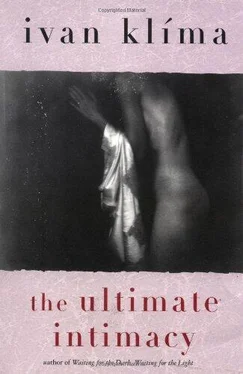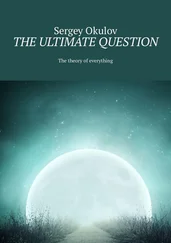Ivan Klima - The Ultimate Intimacy
Здесь есть возможность читать онлайн «Ivan Klima - The Ultimate Intimacy» весь текст электронной книги совершенно бесплатно (целиком полную версию без сокращений). В некоторых случаях можно слушать аудио, скачать через торрент в формате fb2 и присутствует краткое содержание. Год выпуска: 1998, Издательство: Grove Press, Жанр: Современная проза, на английском языке. Описание произведения, (предисловие) а так же отзывы посетителей доступны на портале библиотеки ЛибКат.
- Название:The Ultimate Intimacy
- Автор:
- Издательство:Grove Press
- Жанр:
- Год:1998
- ISBN:нет данных
- Рейтинг книги:3 / 5. Голосов: 1
-
Избранное:Добавить в избранное
- Отзывы:
-
Ваша оценка:
- 60
- 1
- 2
- 3
- 4
- 5
The Ultimate Intimacy: краткое содержание, описание и аннотация
Предлагаем к чтению аннотацию, описание, краткое содержание или предисловие (зависит от того, что написал сам автор книги «The Ultimate Intimacy»). Если вы не нашли необходимую информацию о книге — напишите в комментариях, мы постараемся отыскать её.
The Ultimate Intimacy — читать онлайн бесплатно полную книгу (весь текст) целиком
Ниже представлен текст книги, разбитый по страницам. Система сохранения места последней прочитанной страницы, позволяет с удобством читать онлайн бесплатно книгу «The Ultimate Intimacy», без необходимости каждый раз заново искать на чём Вы остановились. Поставьте закладку, и сможете в любой момент перейти на страницу, на которой закончили чтение.
Интервал:
Закладка:
the moment she's sure she won't bump into him wherever she goes and whatever she does with the one she happens to be with.
At least he is taking with him that architect Vondra who seems to him to flirt shamelessly with Bára. Samuel justifies taking him on the grounds that Vondra is a Moravian and knows the officials they will be dealing with. He is also taking his secretary Ljuba, both because she is capable and because he finds her attractive.
As always, Bára packs his overnight case carefully and goes out with him to the car. She gives him a hug and a kiss. Neither the kiss nor the hug have the warmth he used to feel. And she doesn't even put on a very good show of being sorry he is leaving, despite the fact that acting is her second profession. She cannot completely conceal her pleasure at getting rid of him for a short while at least. Samuel starts the car and takes a last look; Bára is standing on the edge of the footpath waving to him. She is still beautiful, she's tall and statuesque, and for a moment he feels a sharp pang of regret for something that is irrevocably lost, and sorry for himself that his life is constantly taking a different turn from the one he had imagined.
At the office he picks up the papers he needs and it occurs to him to ring home to see whether Bára picks up the phone, but he decides against it. Not because he would feel abashed but because he fears there would be no reply and the uncertainty — or rather the certainty — would play on his mind so much that he would be unable to concen-trate on the negotiations.
He sits Ljuba next to him. She exudes a Gabriela Sabatini perfume (which he had also bought Bára) and youthfulness.
Once on the motorway, Ljuba tries to recount to him the latest episode of M.A.S.H. She wants to please him and has no inkling that he can think of few things that are a greater waste of time than listening to an account of a TV programme. Ljuba then proceeds to impart some bits of news, or rather gossip, about goings-on in the office — Samuel really couldn't care which of his staff are going out together, sleeping together, speaking together, or not speaking together. With one exception, of course: and about his wife no one will ever say a word, naturally, even if everyone knows what he doesn't, and might never know.
Vondra, for his part, talks about New York and Boston where he recently spent a whole month. He tells them about the musical, Cats, giving a passable rendition of Andrew Lloyd Webber's feline hit about
the moon, before relating with considerable enthusiasm a meeting of the Krishna Consciousness Society. He learnt that in the next life, the sort of body people will receive will depend on the way they have lived in their previous incarnation. They could become demi-gods of which there are 33 million, or they could be born as a cat or as a pig and consume their own excrement. Our body is apparently like a bubble that forms on the surface of the water. In a while it bursts and is never seen again. Our soul simply moves from one bubble to another and we stupidly believe it to be the source of our happiness.
"What is the source of happiness, then?' Ljuba wants to know. She, no doubt, dreams of it like all women.
'Coalescence,' Vondra explains. 'Coalescence with Krishna. He's the Supreme Personality of Godhead, the incarnation of absolute truth.'
'Coalescence doesn't appeal to me,' Ljuba says.
Vondra assures her that she won't coalesce, but will definitely turn into some goddess when she dies. A goddess of love and beauty, naturally.
Samuel finds this sort of talk repellent. Young people nowadays have a tendency to make light of things beyond their comprehension, of anything they can't buy or misappropriate in some way.
But Vondra is winding up the topic anyway. 'If you're interested,' he turns once more to Ljuba, 'the Krishna people are supposed to be here in our country too. They could explain it to you much better than me.' And he turns to a subject he knows more about. With a certain disdain he talks about the work of the avant-garde, those intellectual Bolsheviks who fled to the States from Europe in the thirties and changed the face of most American city centres (Vondra actually uses the word 'downtowns'), and New York in particular. In his view, it was a baleful influence and transformed every major American city into one big cemetery with monumental concrete tombs poking up out of them. No, tombs is not the right word, because a tomb tends to be decorated at least, and have a dove or an angel, whereas these are more like gigantic gravestones: in place of carved letters, windows that don't open; in place of angels, television aerials.
One of the reasons why he is saying all this is to impress Ljuba, of course, but it is mainly to pique Samuel. Vondra knows he was a supporter of the avant-garde and that he strove, even in the worst times, to preserve and defend something of their principles.
Samuel could wipe the floor with the young know-all. He could draw his attention to dozens of buildings around the world where the avant-garde proved its prowess, but he doesn't feel like arguing, he doesn't feel like talking at all, in fact. He can feel one of his depressions coming on, and he is beginning to get a headache. He ought to take a tablet, but they are in his bag and his bag is behind him in the boot. He starts to drive faster, not because he is in a hurry, but more out of edgi-ness or a desire to leave behind all that talk, that clichéd meandering from Broadway musical to transmigration of souls, and from incarnation to the Bauhaus.
It is possible to chatter away about all and sundry in the course of a single car journey, express a view on every topic, throw cold water on everything and feel high and mighty. In reality it's all much more complicated and mysterious, both life and death. How many times has he found himself in a place he has never visited before in his life and yet has known precisely what he is going to see! He was walking along a street towards the Herengracht in Amsterdam and all of a sudden he realized that if he were to cross the street and pass through the entrance of one of the buildings he would find a flea market there. How could he have known this, seeing this was his first visit to Amsterdam and nobody had ever spoken to him about a hidden flea market? Why was he born on the first of September like Dietzenhofer? In fact, the first time he came across his portrait in some book and pictured the face without the period wig with its artificial curls, he had marvelled at his resemblance to him. And when he first met Bára, her face seemed ominously familiar. He just didn't know — and only on that point was his prescience or memory hazy — whether it was a good or a bad omen.
As he approaches Jihlava, he recalls how at one time — as if in some other life — he used to hitch-hike to Bratislava to visit his first wife. Scarcely anyone would have imagined a motorway in those days, just as no one would have dreamt that the Republic would break up and Bratislava would be a foreign city. There were fewer cars then, of course, but they used to stop and he would often reach Bratislava more quickly than by train. He remembers making love all those years ago, the passionate embraces and then the sudden despair when he discovered he was no longer loved, no longer desired. And he lost his first daughter Linda before really getting to know her. Not long ago, about six months in fact, she called to see him in Prague. Not just a stranger, but actually a foreigner now. He hardly recognized her at first, but then
he realized she had become more like him. Strange. And she called him otecko, Dad, in Slovak. That was strange too. He had not seen his second daughter Lida for a number of years and had met her husband only twice, maybe three times. They don't live in Prague. Two of his families have broken up and he didn't have the time, or the inclination maybe, to hold on to the children. And his third and last family? It is only self-deception, force of habit or lack of courage not to declare broken something that wrecked itself a long time ago. Nothing in life lasts. Life itself only lasts a moment — a bubble on the water — and it's curious how even for that moment one is incapable of maintaining some deeper feeling, loyalty or devotion. Maybe this depressing state of affairs is also affected by the general state of things. After all, there have been so many turbulent changes in the life of this country that spreads out each side of the motorway. The rich became poor and the poor rich, the powerful lost their power and sometimes their lives, and others took their place. Splendid old buildings fell into rack and ruin and ugly new ones were built. Everything took place at such a frenzied pace, in a mad dance, or a dance of madmen. One either joined in or fell out of the circle and straight into the abyss at whose brink the dance was held.
Читать дальшеИнтервал:
Закладка:
Похожие книги на «The Ultimate Intimacy»
Представляем Вашему вниманию похожие книги на «The Ultimate Intimacy» списком для выбора. Мы отобрали схожую по названию и смыслу литературу в надежде предоставить читателям больше вариантов отыскать новые, интересные, ещё непрочитанные произведения.
Обсуждение, отзывы о книге «The Ultimate Intimacy» и просто собственные мнения читателей. Оставьте ваши комментарии, напишите, что Вы думаете о произведении, его смысле или главных героях. Укажите что конкретно понравилось, а что нет, и почему Вы так считаете.






![Theresa Cheung - The Dream Dictionary from A to Z [Revised edition] - The Ultimate A–Z to Interpret the Secrets of Your Dreams](/books/692092/theresa-cheung-the-dream-dictionary-from-a-to-z-r-thumb.webp)





